For more than a decade, I’ve read Sasha Stone’s Awards Daily site. I love movies, so I check out many left-wing movie sites, and until recently, AwardsDaily was proudly 100 percent left-wing. Its owner and founder, Sasha Stone, loved Obama, loved Hillary, loved Biden… And then something changed. Still residing on the left side of the aisle politically (she’s no Trump supporter), she began to openly rebel against what I call the Woke Terror.
Still, and for a good reason, I remained cynical. Plenty of people on the left push back against the oppressive madness of Woketardery, but they don’t have the moral courage to tell the Full Truth. You can see them straddling both worlds, twisting themselves into intellectual pretzels to criticize the excesses of #MeToo and Critical Race Theory while still looking to salvage their membership in the Elite Left-wing Club.
These moral cowards want it both ways: Hey, this woke stuff is going a bit far, but I’M NOT ONE OF THEM. Trump supporters are evil and dangerous rubes! Blacklist Joe Rogan! Trump and his mob of loyalists should be in jail! Only serial killers remain unvaccinated! No due process for January 6 rioters!
Then Sasha Stone published this.
I had never met Sasha Stone. Never spoke to her or traded so much as a tweet or email. But once she took that step, there was no coming back from (and risked everything she’s worked so hard for); I was eager for an interview. Even before that New York Post piece — which was originally published at her Substack — I found her analysis of the Woke Terror, her unique ability to articulate and explain the damage this New McCarthyism is doing to society and art, to be some of the most insightful and intelligent I’ve come across.
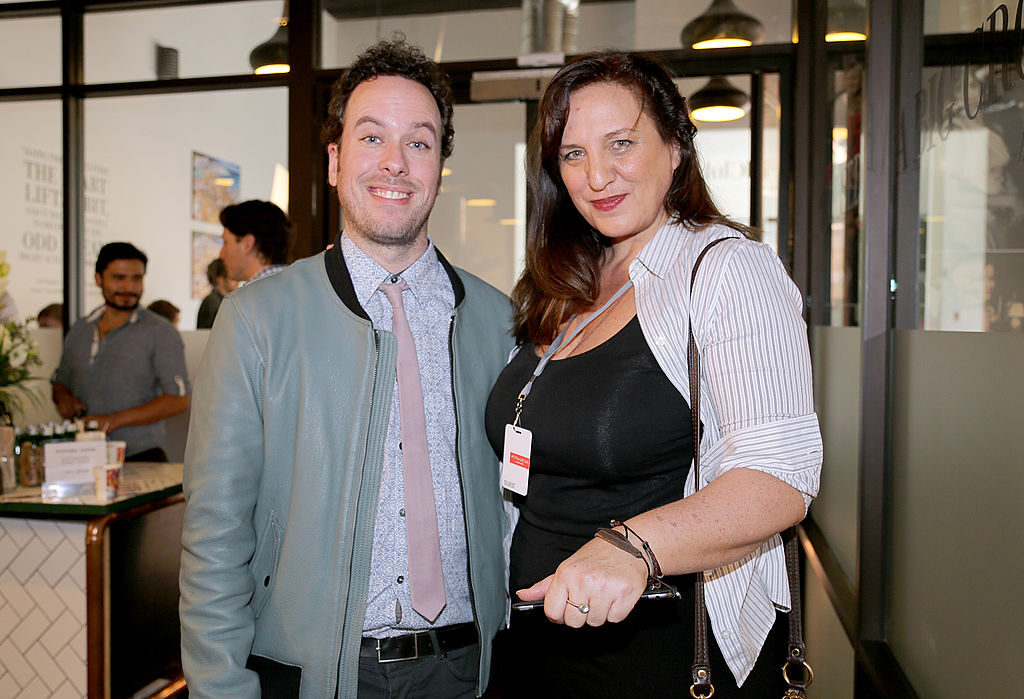
File/Vulture Senior Editor Kyle Buchanan (L) and Founder/Editor AwardsDaily Sasha Stone attend Chrysler’s Oscar Predictions Hosted By VF’s Mike Hogan at the Vanity Fair Social Club on February 25, 2014 in Los Angeles, California. (Rachel Murray/Getty Images for Vanity Fair)
So here’s part one of a two-part interview…
BREITBART NEWS: Tell me about Awards Daily. How you found yourself online and how that site came about.
SASHA STONE: I became an Internet person in 1994. You can cut my life almost exactly in half. Twenty-eight years of my life were a regular life. Twenty-eight years lived online. Once I got online, I stayed online. Everything was online, my social and business life, everything. I was an early pioneer or adopter, whatever you want to call it.
BN: Very early. That was ten years before I jumped online.
SASHA: Back then, people were horrified. They thought everyone on the Internet was weird. I loved it. Back then, it was wide open, the Wild West. You could invent anything you wanted. This was before working websites. I was working in HTML. So I fell in with a cinema group on Listserv, and all we did all day long was write about movies with people all over the world. This is where I learned how to become an online writer—to inspire, provoke, debate, and even troll. It was probably my escape from real life. My life had just spectacularly blown up. I’d just graduated college at the age of 29 by way of a bunch of city colleges. I was proud that I was the first person in my family to graduate college. Then I was accepted at Columbia University film school, which I was very proud of, a dream come true.
BN: Columbia film school. Wow.
SASHA: Yeah, but I dropped out after a semester after falling madly in love with this guy and moving back to L.A. He moved back with his wife.
BN: Whoa.
SASHA: Right? [laughs] And I’m thinking, Great, I just wrecked my life. So it was a choice between staring at the walls or escaping online. There’s a book in there somewhere I’m going to write. But I loved being online and found I was pretty good at predicting the Oscars, starting with Titanic’s big win before anyone else made those predictions. I was never a big Oscar fan. I just liked predicting them. By 1998, I’d met an Italian guy and had a baby. This was when websites started happening — eBay, Amazon. I wanted to stay home with my baby and raise her, so I decided to build a website. This would be my business, my livelihood, and I called it OscarWatch. The idea was to watch all of the movies and start predicting the Oscars early. It would be like a gaming site. I could also watch how the Oscar season operated and crack the code.
Well, I didn’t make money. I had to work a lot of odd jobs.
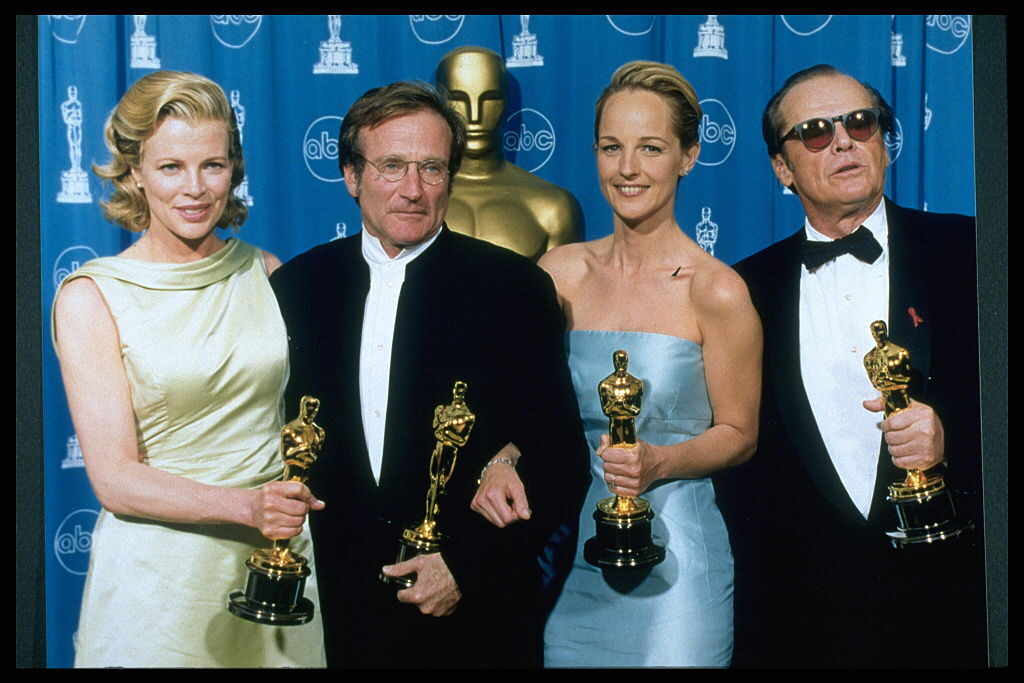
File/70th Oscars ceremony in Los Angeles saw the 1998 launch of OscarWatch by Sasha Stone (Photo by Ronald Siemoneit/Sygma/Sygma via Getty)
BN: What kind of jobs?
SASHA: A sports photographer. I even wrote horoscopes for a while under a pseudonym, which I made up off the top of my head.
BN: Those aren’t real?
SASHA: [laughs] Mine weren’t! I had no idea what I was doing. OscarWatch didn’t really start making money for five years, and I was working on the site full-time. But right away, the movie studios noticed what I was doing. Who’s This? Who’s doing this? The Oscars are a lot like politics with lobbyists. That’s not something I knew then. In a lot of ways, as with politics, the fix is in. So it wasn’t long before a lot of publicists started to contact me. So now I’m finally making money, and what happens? The Academy sued me for trademark infringement.
BN: For using the word ‘Oscar’ in ‘OscarWatch?’
SASHA: Yes. They were okay when it was an amateur site. So I settled and changed the name to what is now, Awards Daily.
BN: Amazing story. You worked hard. You built something from nothing. Is Awards Daily still your site? It belongs only to you? No one can fire you?
SASHA: All mine, and no one will ever give me credit for this, but for better or worse — probably for worse — I did birth this whole [Oscar blogging] industry. After me, the New York Times hired an Oscar blogger, my good friend David Carr, which was at least partly due to me.
BN: yeah, I don’t think anyone had conceived of the idea until you came along.
SASHA: Twenty-two years I’ve been doing this, and I’m making a pretty good living, at least so far. It feels like I’m about to ruin my business [laughs], but so far, so good.
BN: I’m assuming you are dependent on advertising. You also have employees.
SASHA: Yes, which is something I never saw myself doing. But it was David Carr; he was so good to me. The other trades, Variety and the like, treated me like a mistress. They would grab information from Awards Daily but never give us credit. Then along comes David Carr from the New York Times, a titan in that world, and he came right to me, and we became good friends. By taking me to parties, he boosted my status and profile. At that time, I was a janitor raising a little girl on my own, and he told me, ‘Look, you got to start asking for money. Start advertising.’ That advice changed my life, changed my thinking. I don’t make anywhere near what the big trades like Variety make, but I’m now making a pretty good living at it, better than I ever imagined.
BN: Awards Daily is your sole source of income now? No more horoscopes?
SASHA: Other than some freelancing here and there, yes. And my Substack is starting to generate a little income.
BN: This is why I was so eager to talk to you and hear your story. Based on reading your stuff, I figured Awards Daily was your business, that you had built it, and it was pretty much your sole source of income. So at least from my point of view, watching you risk all of that… What I mean is that when you published the piece in the New York Post where you correctly criticized Joe Biden for that speech he gave demonizing Trump voters, you went so far as to defend Trump voters and sympathize with our disgust at the unconstitutional voting rules changes in the 2020 presidential election… You really touched the third rail — at least in your world.
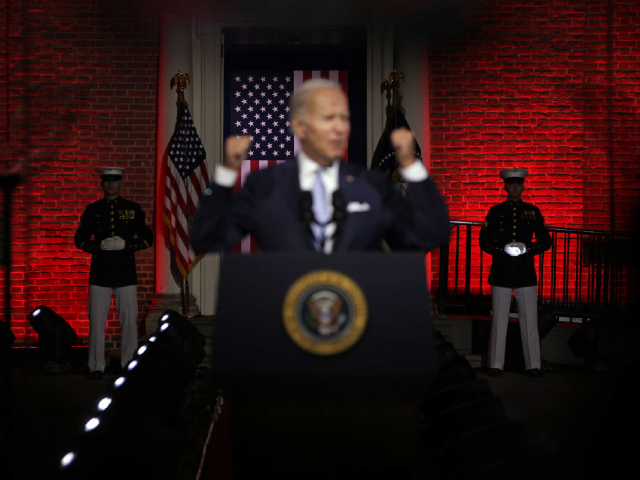
The speech by U.S. President Joe Biden at Independence National Historical Park September 1, 2022 in Philadelphia, Pennsylvania, targeting Trump voters was a bench mark for Stone. ( Alex Wong/Getty)
SASHA: Yes.
BN: From my observation of your work, you seem to be on two tracks. First, you are appalled by the effect of woke politics on the art of movie making and storytelling. Secondly, as I think you’ve written, ‘when your eyes are open, they remain open,’ and you’re looking at the left in a whole new way.
SASHA: Well, and people point this out to me all the time, I was part of the problem. Starting back in 2001, I was writing about the Oscars from the position of race and gender. The actual moral panic began around 2013. Back then, critical and gender race theory were being taught to my young daughter in school, and I was writing about the Oscars in that same exact way. I go back now and read some of that stuff, and I’m horrified by it. I can’t believe I was that angry at the Academy for being so white. Even though I wasn’t pushing for the kind of equity they have in place now, I still believed and have always believed it should be about merit — I didn’t think it was fair that it was SO white for SO long. How could anyone else get their foot in the door?
Doing all that, being that way, alienated a huge portion of my readership. But I thought I had a sense of purpose, that I was doing some good in the world. I’m not saying I influenced the whole thing. I know I didn’t. The movement launched without me, before me. But I was there early; I helped start this what you might call “new religion” with the left. Twitter gave the black community a voice online, and when they began to protest the Academy’s votes, that is really what moved the needle. Twitter can make headlines bigger than I ever could.
BN: You know, I can rage against woke and the left all day long without any fear of blowback. You could lose everything. When did you decide this was so important you were willing to risk it all? You now make it clear in your writing that this movement is — I’ll use my word, toxic — when did your eyes open?
SASHA: It was 2016 when I started to pull back the reins because I noticed that there was something really bad happening after Donald Trump got elected. The Academy changed how movies were chosen. Cancel culture started. I criticized that and was attacked for being racist. And I tried to explain who I was, what I’d been doing all these years, but no one cared. It didn’t matter. If you’re accused, people automatically think that you are guilty. It wasn’t just me being accused of racism. Movies like La La Land, Green Book, and Three Billboards Outside Ebbing, Missouri, were all racist. So now I’m on the other side of all that. But here’s the thing… It’s easy to criticize woke if you’re on the left. Plenty of people on the left do that. What’s harder is talking about the source of it, the Trump part of it. Even if you’re criticizing woke, you’re still required to say something like, Oh, I would never be like Trump. He’s such a racist. Well, that’s just not going to cut it.
BN: Not if you want to tell the truth about what’s happening.
SASHA: Yeah, you go to the source. It wouldn’t have been enough to say ‘some people in Salem are being falsely accused, but there are witches here.’
BN: I can empathize with looking back with embarrassment on previous writings. When I think of my strident, self-righteous support for the Iraq War, it still embarrasses me. And not just because I was wrong, but my tone. So, as you have, I admit I was wrong whenever it comes up. As do you, which is impressive. Because again, you are risking something. Are there others like you? You mingle a lot in the industry, and I’m not asking you to betray any confidences, but do people come up to you in confidence and say, ‘This woke stuff is awful and oppressive?’
SASHA: I used to hear it more than now, but still not as much as you think.
BN: That is disappointing.
SASHA: I’m really close friends with [Hollywood Elsewhere’s] Jeff Wells, and I know he hears it a lot more. Here’s what I think is happening… because conservatives are taking [woke] on so publicly and aggressively, people on the left don’t because they don’t want to align with conservatives or be thought of that way.
A good example would be JD Vance’s Hillbilly Elegy. There was a time when everyone thought his book and his ideas were informative because they shined a light on the white working class. Once the movie came out they trashed it just because Vance is a conservative, obviously, and because those people [portrayed] in that movie would be Trump supporters. Nomadland, a film that won Best Picture, is clearly about Trump supporters. They were chased out of their hometowns because manufacturing went overseas. The movie was not about ‘van life’ hipsters on Instagram. It was about the fringe dwellers, the rebels, the outcasts, and those are Trump supporters. So how can anyone tell the truth about our country, especially if they focus on the white working class, without being able to see that world, to humanize them? The days of Frank Capra and John Steinbeck are long gone.
You have to be able to talk about what is actually happening.
BN: Exactly, and you see this deliberate blind spot and denial everywhere. You see it with the obvious downsides of illegal immigration. You see it with Biden’s obvious age and mental acuity issues, his sunsetting.
SASHA: I want to start a site called Journalism Watch and just report on the bias of the entertainment press. They only report the good on Biden and the bad on the Republican side. It’s so bland, predictable, and uninteresting because it’s not the truth.
BN: So when I look at this woke culture, this is how you see it… Tell me if you agree… Cancel culture is no different from the blacklisting of the 1950s. Two things were true back then: there really were communists looking to undermine the country — Alger Hiss, the Rosenbergs — who were a threat, but it was also used to silence and torment people. People were destroyed because other people didn’t like them, or wanted their jobs, opposed their politics, or as an easy means for the snitch to prove his purity and moral superiority. Fast-forward to today… There are legitimate bad guys like Harvey Weinstein and Bill Cosby, but people are being destroyed without due process for the same mercenary reasons as we saw during the Red Scare. I see no moral difference between the communist blacklist of the 50s and what the left is doing today with cancel culture.
SASHA: I think about this a lot: mass hysteria throughout history, But what we don’t have today are artists on the left like an Arthur Miller or Rod Serling knowing it’s wrong and subversively attacking it through their work. So we’re in this situation where it’s the left that’s doing the witch-hunting when it’s the left that’s supposed to provide the artistic reaction to it. But they can’t do it. They can’t write about it. There’s a vacuum there. There are so many stories that could be told now that would make great movies or plays. But these guys are shut down.
BN: It’s so odd watching this… You and I are almost exactly the same age, we’re both Generation X, and we grew up being taught in school and popular culture that McCarthyism is evil and un-American.. How vital Skokie was. And now same left that railed against McCarthyism became straight-up McCarthyites… It’s really something.
SASHA: And that’s a good argument but one that’s difficult to make because you’re the first conservative I’ve talked to who doesn’t defend McCarthy. Conservatives argue that he did uncover a lot of spies, which is true, but there was still the McCarthyism.
BN: Which is what I meant about two things being true at once. There were bad guys, but the tools to stop those bad guys turned into a disgraceful witch hunt.
SASHA: And who stopped McCarthyism? It wasn’t the shaming coming from the left. It was Eisenhower who realized it was tearing the country apart. The left doesn’t have an Eisenhower or anyone like him. He was a great president.
What I’ve realized is that people like Jon Stewart, Ken Burns, Stephen King, and Rob Reiner… They don’t care if you shame them about cancel culture. They’re only invested in seeing themselves as these heroic white saviors. The McCarthy hearings, like Salem, were driven by fear. What makes this current era weird is the outright denial of it. And this is why I went into the Trump issue [defending Trump supporters]. You can’t go halfway during a mass moral panic, a mass hysteria like this.
BN: Going back to your New York Post piece, Joe Biden had the opportunity to be Eisenhower, to calm everyone down. Instead, he went the full-McCarthy. I’ve never seen a president demonize the American public before. He wasn’t talking about a handful of militiamen. He was demonizing 65 million people. So I read your piece and thought, She’s the real deal. She’s risking everything now. Do you feel like you’re risking everything? You could lose your site through a quiet advertiser boycott, which is your sole source of income.
SASHA: Yes. And it’s not just the Oscars. For a time, I was a fairly prominent Democrat on Twitter, friends with the Steve Schmidts, Evan McMullins, Rick Wilsons. I was connected to the whole quote-unquote resistance. But in 2020, after I saw all the gaslighting around the [Black Lives Matter] protests… I’d never seen that kind of thing before… All this power and money from the center was doing whatever it took to remove Trump and put Biden in power — and Biden wasn’t even campaigning. Once I started calling people out, I got into so much trouble. [top Hillary Clinton adviser] Neera Tanden DM’d me accusing me of changing. But I told her, you have to get to Biden and get him to speak out against these protests and cancel culture. He has to stand up to it. That summer of 2020, when [the Black Lives Matter protests] were really blowing up, no one [on the left] was saying anything about it. People were losing their jobs at newspapers and things like that. So I told her, you’ve got to get to him and tell him to speak out against this. And she instead told me to be quiet until after the election. I told her I couldn’t do that. We ended up unfollowing each other [on Twitter], and that was that. That’s how it started, and, little by little, I’ve been shunned ever since.
BN: This could affect your business.
SASHA: Not so much then because, as I said, a lot of people were speaking out about cancel culture. But now that I’ve crossed the Trump line, yes. And it doesn’t matter that I say I’m not a Trump supporter. I didn’t vote for him. Just the fact that I’ve humanized the MAGA people, and I have, and I have also made friends with a lot of them… That I’m understanding, sympathetic, and empathetic to his supporters and even to Trump himself…
BN: That’s the Rubicon.
SASHA: But it feels good to me. It feels good in my heart and soul… How will people deal with it…? I’ve already had people try to destroy my business. There were people who went after me over my Netflix short, The Summer of the Shark.
BN: Which was excellent.
SASHA: You saw it?
BN: It was terrific. My favorite of the episodes. The other episodes were all about teaching us something. They were fine. But yours was about your love and passion for movies. There was a humility in that I respected. You were sharing your passion.
SASHA: Thank you. But at the time, people wanted to blow it up. They were saying Send me Sasha Stone tweets. They wanted to collect all the terrible things I supposedly said and get the segment canceled.
BN: Unbelievable.
SASHA: And they did it. They went to Netflix and the director with tweets of mine. Never could I imagine doing that or siding with people like that, and I still can’t believe people do.
BN: When you and I were growing up, the worst thing in the world you could be was a snitch.
SASHA: Exactly!
BN: And now we live in a total snitch culture, a culture where if MASH was remade, the sanctimonious, busybody, snitch Frank Burns would be the hero, and the counterculture, anti-authoritarian, live-and-let-live Hawkeye Pierce would be condemned as a #MeToo villain. Our culture used to ridicule Frank Burns, and now people like Frank Burns run the culture.
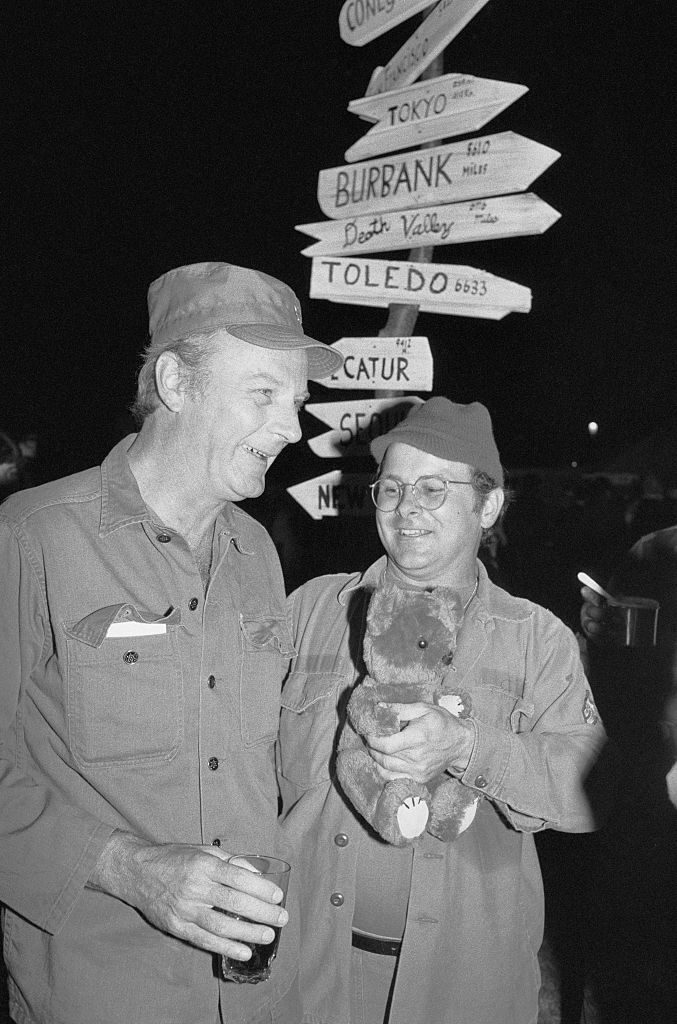
File/Washington, D.C.: Larry Linville (Frank Burns of M*A*S*H) with Gary Burghoff, who played Radar O’Reilly on the television show M*A*S*H. In 2022 the former would be the hero, not Hawkeye Pierce.
SASHA: And what does that mean? It means that everything we grew up with, the Boomers who freed us from what they saw as the Conservative Christian era of the 1950s where artists were told what movies they could make, what stories could be told… they exploded out of that era and made the best movies ever made. They redefined journalism, wrote the best books, gave us rock n’ roll… Everything that defines us, defined Generation X. We were counterculture rebels in our own way. And we always knew there was a Tom Wolfe out there, these authors who took on the culture who don’t exist anymore and couldn’t exist today. Everything is being quietly dimmed. The candle is going out.
BN: I don’t like getting older, but I am grateful to have grown up in the 70s and 80s because this might be it. If there’s one blessing, for lack of a better word, it’s that today’s snitches, these moralists who exhaust themselves policing everything for micro-aggressions, they must be very unhappy people. Come on, that’s no way to live. We were taught Whatever. That’s a word that gave us the freedom, and not in a nihilistic way, but to thicken our skin and allow us to move on rather than obsessing over what others said or did. These people today are so uptight they must be miserable.
SASHA: They are, they are so uptight, and I feel bad that my daughter is coming of age in this. But what people like my daughter have figured out is how to live their lives secretly. Our generation was more about being outspoken. Her generation has learned to self-censor. The other day she told me she had an idea for a book but then came up with a long list of reasons she couldn’t write it because how she’d have to be careful. I told her, Screw it. Write it. You have to be able to tell the truth. You have to survive knowing people think badly of you. The problem is that we have these institutions responding to people throwing fits. And they shouldn’t. They should ignore them and continue to find the best writers, filmmakers, journalists… Let Twitter exhaust itself like the angry toddler it is.
BN: I think the problem is worse than that. I think the people in power want to listen to Twitter. Twitter is their excuse to do what they’ve always wanted to do. In the 80s, the Moral Majority was plenty squeaky and loud, and the culture rightly ignored them. Twitter isn’t intimidating anyone. It’s an excuse. You have those on the left who are scared, sure, and you have those who want to go along to get along and those addicted to proving their purity and moral supremacy. … But you also have the outright fascists.
SASHA: The fascist part of it is certainly true. They think they are on a righteous quest to change the world through monitoring and micro-managing art. But I also think a tiny little part of it is Woke Capitalism, where if they atone, they can stay in power.
BN: And it’s awful watching them humiliate themselves and apologize for something when they did nothing wrong. Look at your situation. I’m sure you support same-sex marriage, but if you were to come out against it, you’d be done, even though less than ten years ago, Barack Obama opposed same-sex marriage.
SASHA: I didn’t vote for Trump, but if I did and said so, my career would be over for sure. The race stuff and now the transgender stuff is potentially career-ending because there is no due process, benefit of the doubt, or presumption of innocence. There is ‘once accused, forever guilty.’ There is an idea that every person is potentially a witch. It isn’t only white people — as you can see by how they go after Clarence Thomas or Candace Owens — if they aren’t good Puritans or ideologically compliant, then something wicked this way comes.
In part two, which will run later this week, we talk about the sell-outs in our culture, Top Gun, and the effect this bullying and oppression have on the art of movies.
Follow John Nolte on Twitter @NolteNC. Follow his Facebook Page here.
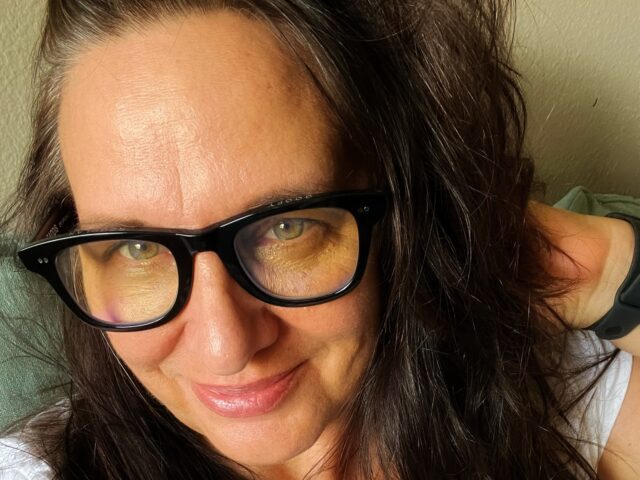
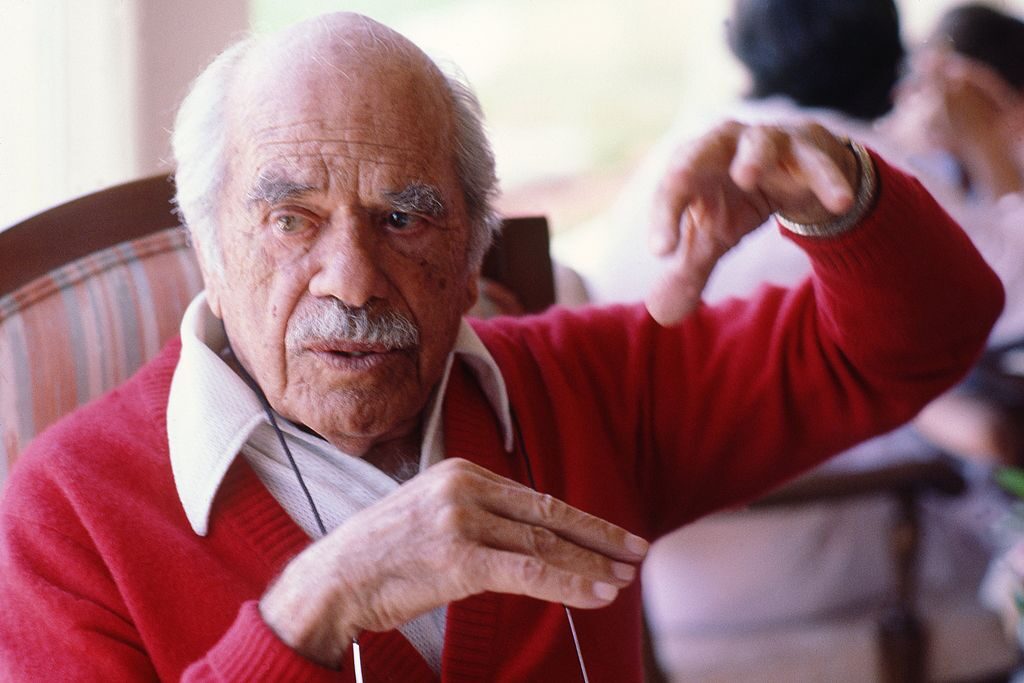
COMMENTS
Please let us know if you're having issues with commenting.